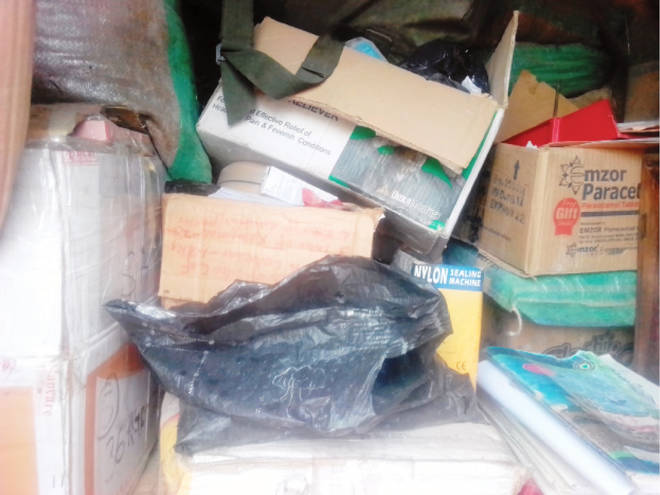
It is 3.30pm. Two ghetto communities of Kaduna city are calm: Abakpa and Unguwar Shanu. One street, a rail line running across, separates both areas. Mud homes face the line. On the other side are shops for mechanics, iron benders, radio repairers and suya sellers. Young people chat in groups.
Homes seem empty, shops abandoned. Eight pm, a complete transformation. Smoke from Indian hemp wraps billows into the night sky. Bottles are uncapped, content downed. It is an area you don’t want to go through by night.
“You can’t see anything in the afternoon. If you want to see how these boys misbehave come in the night around 8 pm,” says a resident of the area.
“There are spots you can’t follow because anything can happen. They usually come out in the night to do their things.”
The bottles are cough syrup, containing codeine. A simple cough suppressant now a street drug for thousands of Nigerians. Police raids have hit the area, but the boys and girls return.
Codeine has been on the drug abuse scene for more than a decade. Psychiatrist Vincent Udenze was among experts who warned of a growing abuse of codeine in 2013, alongside rohypnol (the date rape drug) and cannabis. The warning came from treating young people battling drug dependence and addiction.
Tons of reporting in print and broadcast have tracked the growing abuse of codeine for years. It has taken a coordinated media onslaught following a four-month long undercover project by the BBC to make codeine a “superstar” among abused drugs. The extent of abuse has left the country reeling.
The fuss about codeine
Codeine is not a drug you can buy on the street. It comes in small quantities as part of ingredients used in cough suppressants. Not all cough syrups have them. Most contain as little 10mg of codeine phosphate in a teaspoonful. But their effect is what’s made them much sought after.
Codeine relieves pain and suppresses cough. That’s why it is used in cough medicines. But it is also an opiate-a narcotic drug, with potential for addiction.
Cough syrups containing codeine are sold over the counter, at around N250 for a 100ml bottle. It is cheap, affordable, and a slippery slope to drug addiction.
In high doses, codeine induces euphoria, a sense of being high, feelings of being drunk and altered consciousness. Which is also why it is being abused.
Udenze, founder of Synapse Services, which treats drug addicts explains altered consciousness means you lose consciousness.
“You would observe the person does not seem to be in touch with reality and appears to be quite confused. This is usually present when there is a heavy consumption or overdose of a codeine-containing substance or syrup,” he says.
“You may also notice that when there is altered consciousness, their breathing might be affected and their extremities like hands might be a bit clammy and cold.”
At the same time, it has short-term side negative effects: nausea and vomiting, excessive drowsiness, confusion, dry mouth, constipation, allergic skin reaction or rash.
At high doses, codeine can be dangerous, depressing breathing. Breathing slow, the heart rate drops and blood pressure falls.
The men and women crowding Galadima ward in Maiduguri face these hazards day and night. Sharia law doesn’t allow alcohol. The smell of marijuana smoke is constant in the air. Dealers sell cigarettes by the hundreds.
And then something on the side too: cough syrup laced with codeine. You don’t have to cough out N250 for a whole bottle. Dealers dole out the syrup using the serving cap that comes with the bottle to anyone-boys, girls, students, housewives.
In Taraba, raids by law enforcement have forced codeine-laced syrup into scarcity. Bottles cost N200, now they sell as high as N1,500-if you can find them. Users unable to afford bottles buy quantities measured out in bottle caps.
Security challenge in the northeast in the wake of Boko Haram insurgency has left thousands of women widows and single parents.
A great percentage of women and youth across Maiduguri, including students of tertiary institutions, working class ladies, married women and a vast majority of unemployed girls are hooked on drugs even among internally displaced persons on camps, a recent survey found.
Codeine is the start of a very slippery slope into drug addiction
Slipper slope
HauwaShuaibu (not her real name) is a student at University of Maiduguri but has been on codeine since 2014. At the height of her addiction, she took five bottles a day-that’s 500ml in total, the equivalent of a 50cl bottle of coke.
“Not only me, all my roommates, my friends consume codeine,” she says.
“I used to consume 8 to 10 bottles.”
She got introduced to codeine at the most unsuspected scene: a wedding ceremony in 2013.
“I was the shy type. My friend told me to take it and I did. Since then I have taken it every day. At time I buy coke and mix in the cough syrup so people will not suspect me. I don’t think I can do without it.”
Organisations like the Youth Federation for World Peace (YFWP) are battling addiction among populations of Borno state, starting with 200 girls and 500 tricycle riders in Gwange and Bulaburin areas of Maiduguri.
“Codeine syrup has become the favourite drug of abuse by all classes of girls,” says YadomaMandara, project director of YFWP,
“Addiction to codeine syrup is turning the otherwise conservative girls and women in the state into social miscreants and rebellious housewives. It is a trend now to see young women frolicking with bottles of soft drinks mixed with bottles of codeine.”
Codeine can be the start of a drug habit that leads to other drugs. It doesn’t end with codeine, says Udenze.
“Many of the patients that we see would not be addicted to codeine alone. Sometimes it is multiple substance abuse. Some have codeine and cannabis, some have codeine and rohypnol. Sometimes you have a combination of these substances being abused.”
Codeine abuse goes right alongside tramadol use among young people. Mixing codeine with other drugs increase risk of overdose and respiratory depression, which can be fatal. Users face side effects that include vertigo or dizziness, stomach upset and loss of appetite, indigestion, hallucinations, tremors, depression, inability to urinate.
Usman Abubakar started with codeine as a teenager, then moved on to cannabis.
Cannabis is an issue for many young men like him in Borno, but codeine-containing cough syrup is “an emerging cancer ravaging women and girls”, he says.
The state ranks fourth, after Kano, Kaduna and Jigawa for drug abuse, according to the National Drug Law Enforcement Agency. Up to 3 million bottles of codeine-laced cough syrup are taken each day between Kano and Kaduna.
This week the government banned importation of codeine, stopping its use in cough medication. That leaves only codeine-free cough syrups on the pharmacy shelves. Regulators have vowed to clean up all remnants of codeine-containing syrups and enforce the ban.
But that’s only scraping the surface. Experts worry the ban may fuel an underground import and market for codeine-laced cough syrups.
“It is unfortunate that instead of focusing on making sure these substances don’t get distributed illegally, that we are having to ban the production of codeine-containing cough syrup,” says Udenze.
“But I do understand that it is now an epidemic and this might be the best solution at this point in time whilst we sort our house in order in terms of looking at distribution and how prescription-only medications are processed.’
People taking excess dose of codeine could potentially lose consciousness, go into cardiac arrest or have their breathing collapse. Flow of oxygen to organs decreases and that can be devastating. Without enough oxygen, tissue in the brain and heart can die, leading to permanent organ damage or even death.
Last year, the National Drug Law Enforcement Agency in Katsina arrested some 50 students, including 13 girls, all under age 18. The same year, it seized 432kg of illicit substances-nearly 250kg of cannabis and 997 bottles of codeine-containing cough syrup, the equivalent of nearly 100 litres.
Between January and March this year, the agency has arrested 12 university students with more than 150 bottles of cough syrup, some cannabis and rohypnol.
They also intercepted a trailer load of 24,000 bottles of codeine-laced cough syrup.
One nongovernment group linked the growing use of codeine-laced cough syrup among women to boredom and neglect.
“We have severally interacted with married women victims and realised that their husbands have neglected them, giving them less care and family time,” says Khadija Saulawa, leader of Queen Dijah Initiative on Women and Children.
“As such they go into it to ease the pain of boredom.”
Abubakar Usman has battled addiction and is now a champion against it
The risk is in starting at all
Overuse of codeine shows symptoms, if you are observe; blue lips, loss of consciousness, pinpoint pupils, no or sluggish pulse, shallow breathing, chest pain, frequent vomiting and extreme fatigue.
But the trick with abusing codeine is that it makes you want more codeine.
Long-term effects are dangerous and fatal: insomnia, nightmares, pain when not using the drug, liver damage, seizures.
Your body learns to tolerate the euphoria and pain relief that codeine induces. Slowed heart rate and breathing follow later. As you take more and more of it, risk of overdose increases and lung function reduces, bringing on other medical complications: organ damage, coma and death.
Alongside the physical problems, dependence on codeine ruins social connections and lifestyle. You face financial problems trying to maintain your codeine supply, emotional and relationship issues emerge, you lose ability to work, even take to crime to maintain supply and lie to cover up addiction when confronted.
This might explain the rising crime rate in UnguwarShanu, the Kaduna ghetto mentioned at the outset.
As if that isn’t bad enough, there are other concerns to consider.
“Codeine is an opiate and when people-it doesn’t matter if they are young or old-abuse codeine and continue to take large quantities of this medication, they develop tolerance and this means they will need larger quantities to get the desired effect,” says Udenze.
“There is also a likelihood they will start looking for more potent opiates to use. And one potent opiate that you really do not want young people to start abusing is heroin.
“It is very important that we really get hold of this problem, tackle it, because heroin addiction will definitely be a bigger problem on our hands, if that should take over our youth.”
Usman has lived through addiction to tell the late. It started with codeine and spiraled through cannabis and tramadol. From a drug addict, he now leads prayers at his local mosque.
“I am proud to tell you that drugs can only suppress your problems for a while, when I told my friends that I have stopped indulge in drugs they thought I was joking, they even tell me I am still coming back, but today months over months I never smoke cannabis, nor inject myself, or taken codeine and tramadol,” he says.
“I was once rejected by my parents due to drug abuse. I will like to beg those who abuses these illicit drugs to stopped, I am respected in the society today, it will surprise you to know that I am the Liman in our mosque. Satan has failed over my life and I’m a changed person.”




